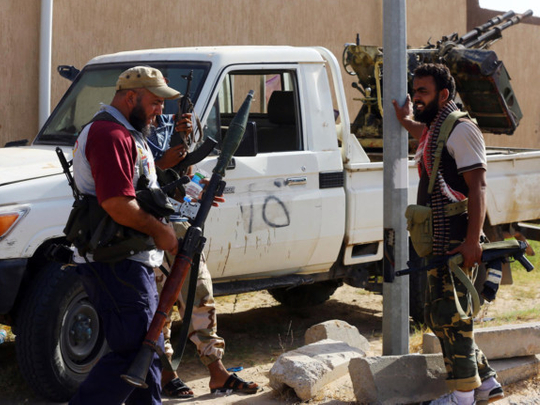
United Nations: Rapidly deteriorating security and deepening political divisions have brought Libya “closer to the brink of protracted conflict and civil strife,” the top UN envoy in the country warned on Monday.
Bernardino Leon, who took over two weeks ago as the head of the UN mission in Libya, told the Security Council that during his just-concluded first official visit to the country he stressed that the solution to the current crisis can’t be achieved militarily but requires political consensus.
The increasingly fractured country was plunged into turmoil following the 2011 Nato-backed uprising that toppled longtime dictator Muammar Gaddafi. His ouster gave rise to a patchwork of heavily armed and increasingly unruly militias and deep political divisions that have left the country with two rival parliaments and governments.
Leon said he warned all parties “of the dangers of creating parallel political institutions and processes, which can only contribute to further division and polarisation.”
Leon said all parties to the conflict acknowledged deep political differences and a “profound sense of distrust.”
“Yet they all underscored the need to overcome those differences, to end armed hostilities, and for the political process to resume as soon as possible in order to prevent further polarisation and division,” he said.
Leon told the Security Council that achieving this won’t be easy.
In eastern Libya, “renewed military confrontations in Benghazi threaten to exact an increasingly heavier toll on the civilian population,” he said. “In the west, an unrelenting campaign of indiscriminate shelling continues to target large sections of the Warshafana area near Tripoli, causing untold suffering on the part of the civilian population.”
Leon said there would be no progress in efforts to end the crisis if fighting continues, a view backed by the UN Security Council which called for an end to the violence and the political crisis and the illicit transfer of weapons and other support to armed groups.
The council reiterated its call for the continuation of the political transition, especially through a ceasefire in the Werfashana area and in Benghazi and other parts of the country.
Council members also expressed concern at the 300,000 Libyan civilians who are displaced or who have fled the country due to the violence. They also expressed the importance of protecting the human rights of all Libyans.
US Ambassador Samantha Power said the US is very concerned at the ongoing violence and political instability and stressed the need for the parties “to engage in dialogue and a political solution [which] is the only way forward.”












